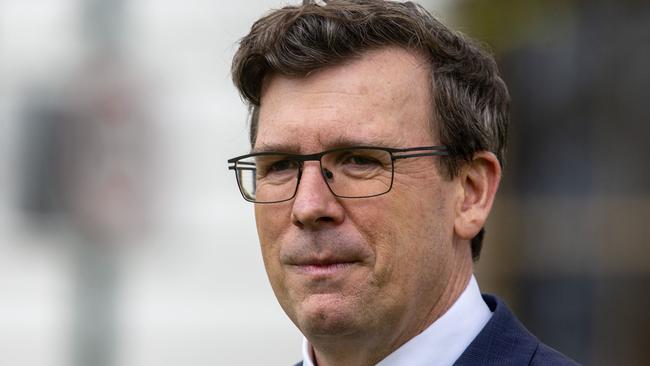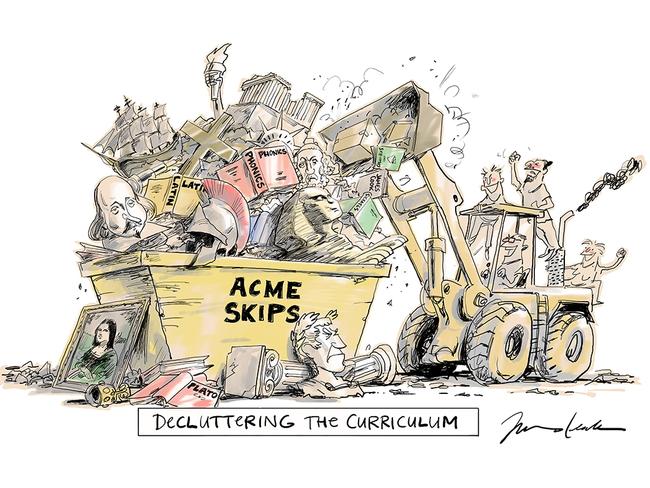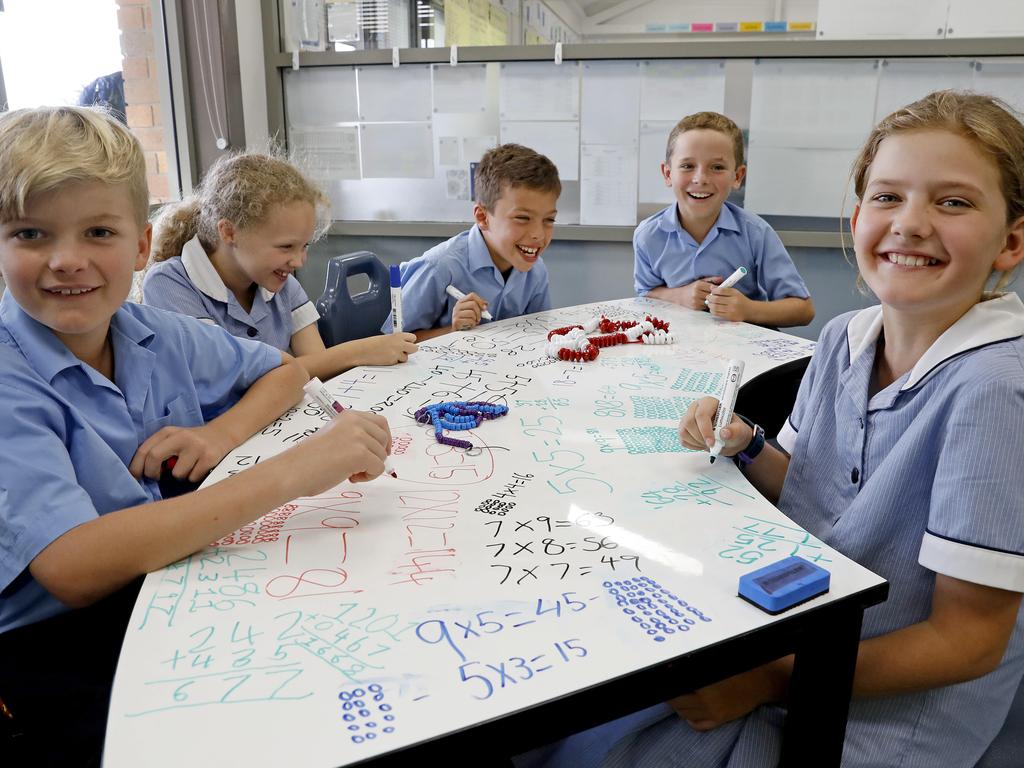A nation of cretins: class curriculum revamp fail
State and federal education ministers are set to oppose elements of a proposed new school curriculum that bolsters Indigenous perspectives and recommends unsubstantiated teaching methods.

State and federal education ministers are set to oppose elements of a proposed new school curriculum that bolsters Indigenous perspectives and recommends unsubstantiated teaching methods, as one of the nation’s leading educators claims that planned changes would “create a nation of cretins”.
Federal Education Minister Alan Tudge flagged concerns over proposals for history and mathematics, as well as the draft curriculum’s support of inferior practices for teaching reading, revealing that he will not support several proposed changes.
Federal, state and territory ministers met to discuss the changes on Friday in Melbourne, where the response was “lukewarm”. It is understood that several states harbour concerns that some proposals are not supported by evidence.
As opposition to the draft curriculum builds, one of the authors of the 2014 national curriculum review launched a scathing critique, claiming the proposals “prove conclusively that the Australian school curriculum is now totally politicised”.
University of Queensland emeritus professor Kenneth Wiltshire called for the Australian Curriculum, Assessment and Reporting Authority, responsible for the new draft curriculum, to be abolished. “We will create a nation of cretins awash in a world where they have no understanding of the history of civilisation, human thought, human philosophy, values, or principles which have produced lessons to be acknowledged by all societies,” Professor Wiltshire said of the push to crunch the humanities.
“No amount of swiping screens or pushing buttons to pop up unsubstantiated internet entries will compensate for this.”
Revisions to the Australian curriculum were unveiled on Thursday following a 12-month review requested by the Education Council in response to concerns about the nation’s declining academic results.
Writing in The Weekend Australian, Mr Tudge says the national curriculum “must set a higher overall standard for educational achievement in Australia”.
“The current draft has many good elements, but also some concerning changes that I will not support,” he said.
One of the most notable proposed changes is to the humanities curriculum. While overall curriculum content is being scaled back by about 20 per cent, the elevation of Indigenous history, culture and perspectives across the humanities has come at a cost of topics dealing with ancient history and Western civilisation.
Students will learn about the arrival of the First Fleet “as an invasion”, the significance of trade to First Nations People of Australia and “the sophistication and significance of First Nations Australians’ complex societies and cultures, changing social organisation and political and economic systems”. In secondary school, students will no longer be taught that Australia is a secular nation with a “Christian heritage”, and will instead learn about a “culturally diverse, multi-faith, secular and pluralistic society with diverse communities, such as the distinct communities of First Nations Australians”.
Acknowledging that the teaching of history “will always be contentious”, Mr Tudge says there is an opportunity to “enrich the history curriculum with more emphasis on Indigenous history and Indigenous perspectives”.

“This would be a positive development and build on the progress already made on this dimension,” he says. “It should not come at the expense of the teaching of classical and Western civilisations and how Australia came to be a free, liberal democracy.
“We live in one of the most prosperous egalitarian societies in the world and children should develop an understanding of how this came about. If we diminish this understanding, we are less likely to protect and defend it.”
The minister also cites concerns that have already been raised about the English curriculum, particularly its continuing support for contentious whole language teaching approaches, including the use of predictable texts and having children rely on pictures and meaning to guess unfamiliar words, despite several states recently removing them from their own curriculums and teaching guidance.
“We have had many years of education fads in schools which have now been proven categorically as not being effective,” Mr Tudge says.
“The teaching of reading is one of the best examples where, for many years, children were taught whole language methods to the exclusion of phonics where you decode the words by sounding out the letters.
“When reading experts such as (MultiLit director) Jennifer Buckingham raise the alarm on the draft curriculum, then we need to proceed cautiously. The curriculum must embed content and teaching practices which are evidence-based.”
Mr Tudge is likely to garner some support on the issue from NSW and South Australia, which have both adopted mandatory phonics screening checks for Year 1 children — a policy promoted by the federal government — and have invested in training teachers to deliver systematic synthetic phonics instruction, which has been linked to improved student reading outcomes.
NSW Education Minister Sarah Mitchell said the state would continue to work with the federal government and would be providing feedback.
However, she stressed that NSW preferenced explicit teaching methods, which is in contrast to the problem solving and inquiry approach that ACARA is proposing to embed across maths and science.
“In NSW, our curriculum reforms focus on building the core knowledge of our students explicitly and systematically, particularly in the earlier years. This helps students grasp the basics as they build a strong foundation to learn,” Ms Mitchell said.
“Our explicit approach to the NSW curriculum will mean that evidence-based practices, like teaching reading using phonics, feature prominently as will learning maths basics before progressing to more complex problem-solving.”
Professor Wiltshire shared Mr Tudge’s concerns about “fads and whims” in education. His co-chair on the 2014 curriculum review, Kevin Donnelly, has also being scathing of the proposals, accusing the curriculum writers of promoting “cultural relativism”.
“ACARA, which is completely controlled by national and state (and) territory politicians is an educationally discredited body with very little education knowledge or foundation, or true curriculum design expertise,” Professor Wiltshire said.
“The curriculum is still full of biases and wrong facts — ACARA must be abolished.”
He said Australian education had strayed far from the universally accepted pillars of curriculum design: “learning to know, learning to do, learning to be, and learning to live together”.
“Australians both young and old will become the pitied laughing stock in international circles and be denied access to important positions of positive influence in the world,” he said.
Mr Tudge urged the community to have input on the proposals.
“The draft curriculum is just that: a draft,” he said. “Inevitably, the final product will not please everyone, but there is an opportunity through this review process to elevate our standards.”







To join the conversation, please log in. Don't have an account? Register
Join the conversation, you are commenting as Logout